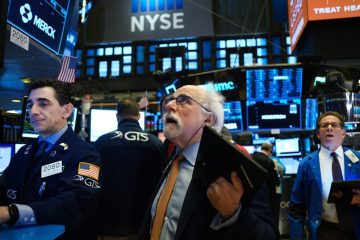US : Week Ahead – After market spasm, Wall Street looks past Brexit

A week-long convulsion in U.S. stocks induced by Britain’s vote to leave the European Union has left some on Wall Street feeling a little bit better thanks to stronger expectations of prolonged low interest rates.The result of the June 23 referendum has created a bounty of uncertainty about the future of the United Kingdom, Europe and the global economy. But since those questions will likely take years to answer, many U.S. investors are focusing on what they see as an immediate, virtual certainty – that the Federal Reserve will not raise interest rates anytime soon.
“The Fed is the 800-pound gorilla, but it’s an 800-pound gorilla that’s been pushed back in its cage, and it’s not going anywhere,” said Ted Weisberg, a trader with Seaport Securities in New York. “I would have to think that the bias will continue to be on the positive side for the market.”
Following the S&P 500’s sharp 6 percent drop and near-complete recovery since the referendum, the benchmark stock index is back in familiar territory, just short of record levels it has repeatedly failed to breach for over a year.
The S&P gained 0.19 percent on Friday, bringing its gain over four days to 5 percent.
Extreme currency volatility and global financial uncertainty created by Brexit have left most traders expecting a U.S. rate hike well into 2017 at the earliest, compared with late 2016 prior to the vote. Historically low interest rates have fueled U.S. stock gains since the 2008 financial crisis and many investors fear that higher rates would imperil future gains.
While U.S. investors monitor the slow unfolding of Brexit in Europe, the June U.S. employment report on July 8 will be an immediate focal point made more important by last month’s surprisingly anemic jobs data.
Even an unexpectedly robust June jobs report hinting at inflation would probably not be enough to lead to expectations of a rate hike anytime soon, strategists say. But another weak report could damage sentiment if it is interpreted as a sign that the U.S. economy is on shaky ground.
“If there is another shock, people will identify that as a trend and there will be recession worries,” said Aaron Jett, vice president of Equity Research at Bel Air Investment Advisors. “Even if the jobs number is good, we still think the Fed can use Brexit as an excuse to not raise rates.”
Investors will also begin to focus on U.S. corporate profits. Wells Fargo & Co, Citigroup and JPMorgan Chase & Co will be among the earliest U.S. heavyweights to post second-quarter results, all reporting in mid-July.
With U.S. companies stuck in an earnings recession since last year due to slumping oil and a brawny dollar, analysts expect second-quarter results to fall 4 percent across the S&P 500, not quite as bad as the previous quarter’s 5 percent slump.
S&P 500 aggregate earnings are expected in the third quarter to grow for the first time since 2015, although forecasts have slipped since the Brexit vote as investors fret about the effect of renewed dollar strength and potential economic stumbles in Europe, according to Thomson Reuters data.
“If executives use Brexit as an excuse to take down earnings guidance by more than a couple of percentage points, then I think markets will be in for a pullback,” said John Canally, chief economic strategist for LPL Financial.

